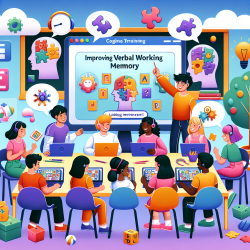Understanding the Role of the Left Anterior Temporal Lobe in Word Reading
As a special education director, staying abreast of the latest research is crucial for improving educational practices and outcomes. One area of interest is how the brain processes word reading, particularly through the left anterior temporal lobe (ATL). Recent research published in Frontiers in Psychology sheds light on this topic, offering insights that can enhance our understanding and teaching of reading skills.
The Study's Findings
The study investigated the reading abilities of individuals with the semantic variant of primary progressive aphasia (svPPA) and compared them with Alzheimer's Disease (AD) patients and healthy elderly adults. The research utilized voxel-based morphometry (VBM) to explore the relationship between gray matter volume in the left ATL and word reading performance.
Key findings include:
- svPPA patients showed lower accuracy in reading exception words and made more regularization errors compared to control groups.
- For regular words, svPPA patients also exhibited a greater number of errors related to complex orthography-to-phonology mappings (OPM).
- Gray matter volume in the left ATL was associated with the number of regularization errors, indicating its critical role in reading exception words.
- The left lateral ATL was particularly involved in processing complex OPM, suggesting its role in integrating semantic and phonological information.
Implications for Practitioners
Understanding the role of the left ATL in reading can have significant implications for educators and therapists working with students who have reading difficulties. Here are some ways practitioners can apply these findings:
- Targeted Interventions: Develop reading interventions that focus on enhancing semantic processing and phonological integration, especially for students struggling with exception words.
- Neuropsychological Assessments: Consider assessments that evaluate the integrity of the left ATL in students with reading impairments to tailor individualized education plans (IEPs).
- Professional Development: Encourage further research and training on the neurobiological underpinnings of reading to equip educators with the knowledge to support diverse learners effectively.
Encouraging Further Research
This study opens the door for further exploration into how different brain regions contribute to reading. Practitioners are encouraged to stay informed about ongoing research and consider participating in studies that investigate the neural mechanisms of reading. By doing so, they can contribute to a broader understanding that ultimately benefits students with reading challenges.
To read the original research paper, please follow this link: The Role of the Left Anterior Temporal Lobe for Unpredictable and Complex Mappings in Word Reading.










